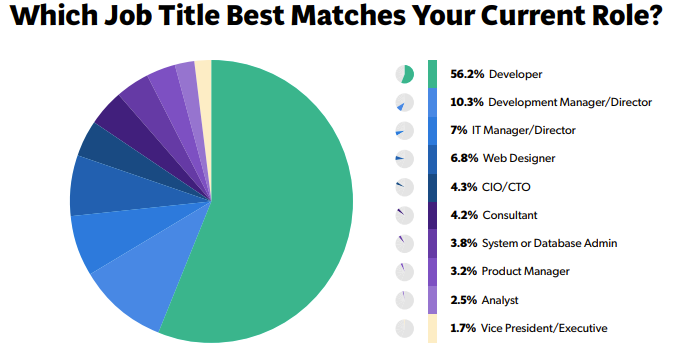
2023 PHP Report Overview: Top PHP Development Trends
Every year, Zend puts out a PHP report on the state of the PHP ecosystem called the PHP Landscape Report. This PHP report series is based on surveys of the PHP community, and reveals key trends shaping the PHP world.
The 2023 version of our annual PHP report, which is now available, showed a number of changes to how teams approach PHP development, including details on the types of applications they are developing, their development priorities for the upcoming year, and the most common challenges they face.
Editor's Note: The 2025 PHP Landscape Report is now available. Get the latest on the state of PHP by downloading the 2025 edition of the report.
About Our 2023 PHP Report
The Zend 2023 PHP report, titled the 2023 PHP Landscape Report, is based on the results of an anonymous survey conducted between the months of October and December of 2022. The survey, which was promoted via social media and email, focused primarily on how PHP development teams are working with the language, their priorities in PHP development, versions they use and plans for upgrades, and the technologies they use in deploying PHP applications.
Respondent Demographics and Firmographics
Like previous years, the 2023 survey had a majority representation from developers. The top three respondent categories were developers, at 56.2%, development managers and directors, at 10.3%, and IT managers and directors, at 7%.

Looking at team size, 38.6% of respondents reported having a development team size of between 3-8 developers. The next highest segment, at 20.4%, was teams between 10-20 developers – marking significant representation for large or development-focused organizations. Overall, teams with more than 10 developers represented over 43% of all respondents.

When asked to share company size, we found a nearly even split between companies with 10-20, 21-100, and 101-1000 employees. Contractor/Freelance and Enterprise companies rounded out the results with 15% and 12.1% of respondents, respectively.

Back to topDownload the Full 2023 PHP Landscape Report
The full 2023 PHP Landscape Report is here, and it's packed with amazing data and insights into the key trends and technologies used in developing and maintaining PHP applications. Grab your free copy today via the link below.
2023 PHP Development Trends
One of our favorite parts of our yearly report series is asking respondents to share details on the types of applications they're developing, and their team's development priorities as they head into the new year.
PHP Application Types
Every year we ask respondents to share the type of PHP-based applications or systems they work on. This year, respondents were allowed to select more than one answer choice. The top three categories were unchanged from 2022, with over 66.6% of respondents working on services or APIs, and over 60.5% working on internal business applications. CMS systems were again third, at 46.6%

Source: 2023 PHP Landscape Report
The focus on web APIs is to be expected, as PHP’s original target was the web, and it has always “spoken HTTP” at a fundamental level. The fact that so many organizations are building internal business applications speaks to the ability of PHP to adapt quickly in order to produce business value.
PHP Development Priorities
Similar to our 2022 results, our 2023 survey found “building new features” as the highest priority, followed by “security” as the second highest priority. “Improving code quality” and “improving performance” flipped spots, with respondents viewing the former as a higher priority. “Deployment automation / orchestration again rated as the lowest priority for PHP teams.
Deployment automation and orchestration are often seen as a task done once and then left alone, and this is reflected in our survey findings. Often, however, we find that automation can be the reason we are able to accomplish (or fail in) our other priorities. With automation, we can push our new features and security patches quickly and confidently. Automation also allows us to push changes that improve performance — and quickly revert them if we measure decreases.
One aspect we have also noted over time: the ability to run QA tooling in our automated CI systems has led to an increased focus on code quality in the PHP ecosystem.
Maintenance vs. Feature Development
Another area we looked at in this year's report was development priorities, specifically the balance of time spent maintaining and troubleshooting their applications vs. the amount of time spent developing new functionalities.
Our survey found over 36.8% of respondents spending 25% of their time on maintenance, and 75% on developing new features and functionalities. A 50/50 split was the next highest selection at 25.4%. Overall, 46.4% noted that their teams are spending at least 50% of their time on maintenance and troubleshooting.

Source: 2023 PHP Landscape Report
When looking at responses by company size, companies with over 100 employees had a 4% higher number of teams spending more than half their time on maintenance and troubleshooting.

Source: 2023 PHP Landscape Report
With close to half of respondents indicating they are spending 50% or more time on maintenance, there is clearly room for improvement when developing PHP applications. A common theme observed in the PHP ecosystem the past few years is that the pace of change within the PHP language itself is leading to issues managing PHP upgrades, particularly with regards to feature deprecations and subtle language changes that can lead to application errors.
One solution for this is to use long-term support editions of the language to delay migrations; however, this may not address things such as lack of security fixes in versions of PHP libraries on which your applications depend. As always, investing in CI/CD pipelines can help you identify and issues early in your development process; Zend offers services to help you implement these.
Back to topTop Challenges for PHP Teams
Developing PHP applications inevitably includes overcoming challenges and obstacles. So what are the top challenges PHP developers are facing in 2023?

Source: 2023 PHP Landscape Report
Our survey found performance issues as the most common challenge with 32.2% of responses, followed by debugging at 29.8%. Integrating with other systems came in third at 27.5%, with hiring and dependency management the next most common options at 24.4% and 24.1%, respectively.
Back to topMost Important PHP Features for PHP Developers
In our next question, we asked respondents to weigh in with what they consider to be the most important PHP features to their work. Respondents were asked to rank each feature on a scale of one to ten, with one representing the most important feature and ten representing the least important feature.
With an average rating of 2.74, respondents viewed database and other service connectivity features as the most important PHP feature set, followed by web request features (3.38), OOP features (4.5), web server integrations (4.68), and async capabilities (4.84). The lowest rated feature was JIT compilation, which averaged a 5.63 rating out of 10.

Source: 2023 PHP Landscape Report
It’s not surprising to see database and other service connectivity features at the top of the list, especially when you consider three-quarters of respondents noted they are using a relational database with the language. Web request features are no surprise, either, considering that PHP is still far and away the favored backend language for web applications.
While JIT compilation is a good advancement for the language, we weren’t surprised to see it as the least important feature for respondents. While it can contribute to performance improvements, the various benchmarks and tests have indicated that its impact on the vast majority of PHP applications is negligible.
Back to topFinal Thoughts
The PHP development experience in 2023 is summed up well by our findings on priorities. Teams are simultaneously being asked to prioritize new features while being tasked with maintaining -- and upgrading -- their applications. It's not a new story, but it's one exacerbated by the number teams still using EOL PHP versions (our report found 61% using EOL versions at the time of the survey). The survey also points to PHP development teams being tasked with improving the performance of their applications -- which may be an indicator of the growing costs of both on-premises and cloud deployment.
There is a lot more data and analysis to unpack in our 2023 PHP Landscape Report, so I would encourage readers that haven't done so already to go and download the report. Look at the data, form your own conclusions, and let us know your takeaways on Twitter/X or LinkedIn.
Additional Resources
- Blog - PHP Trends to Watch in 2023
- Webinar - 2023 State of PHP Development
- White Paper - 2023 PHP Landscape Report
- Webinar - PHP 2022: Year in Review
- Blog - PHP Cloud Hosting, Containerization, and Orchestration Trends to Watch


